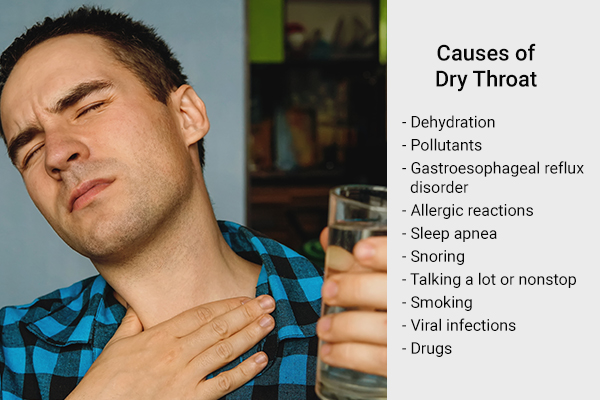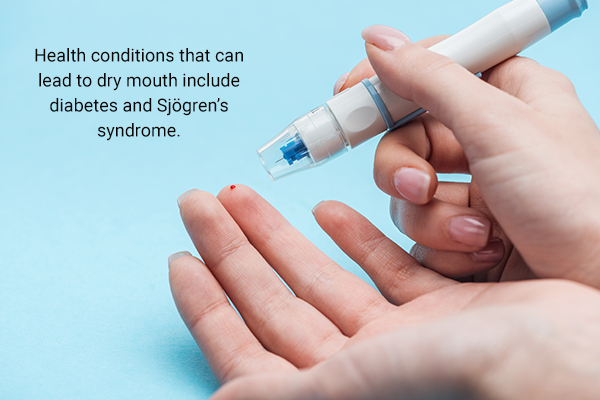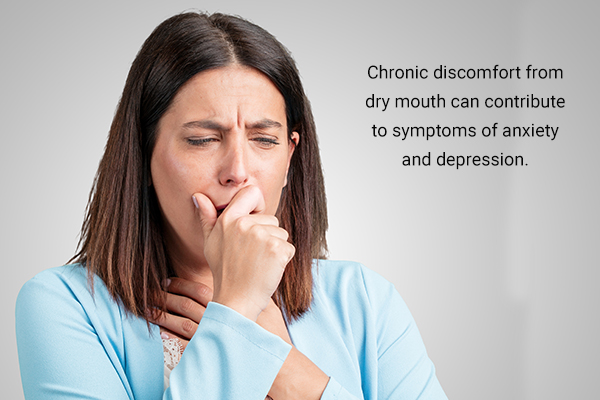In this article:
Having a dry throat can be a real nuisance, right? It can happen for various reasons such as allergies, a pesky cold, or even talking a bit too much. Basically, it’s when your throat feels parched and uncomfortable. (1)

Dry throat, also called xerostomia, happens when your mouth doesn’t produce enough saliva. It can cause discomfort, make it harder to speak and swallow, make wearing dentures a hassle, give you bad breath, and even lead to tooth decay and oral infections. It’s quite common among older adults, affecting about 20% of them. (2)
This article will discuss the causes, symptoms, and complications of a dry throat, as well as medical treatments to alleviate this uncomfortable condition.
Causes of a Dry Throat
Here are some of the things that can cause a dry throat and dry mouth.
1. Dehydration
When you don’t drink enough fluids, your mouth can become dry, and you may even experience other symptoms such as headaches or feeling thirsty.
Mouth breathing and being in a dry environment can also dry out your throat, especially if you’re not staying hydrated. (3)
2. Pollutants
Pollution can also contribute to a dry throat. Airborne pollutants from vehicles, fireplaces, and factories can cause inflammation in the airways. This can lead to chronic airway diseases, especially if you’re exposed to these pollutants over a long time. (1)(4)
3. Gastroesophageal reflux disorder
In gastroesophageal reflux disorder (GERD), stomach contents come back up the esophagus, which can cause symptoms such as heartburn, wheezing, and a sore throat (dry throat can lead to a scratchy, uncomfortable sensation in the throat, which is commonly known as a sore throat).
To reduce the symptoms of GERD, doctors may recommend elevating the head of your bed and avoiding foods that can trigger reflux. (1)
4. Allergic reactions
Allergic rhinitis, also known as hay fever, can cause a blocked nose. When you can’t breathe through your nose, you might breathe through your mouth, which can lead to a dry throat.
Antihistamines can help with allergy symptoms, but they may also cause dry mouth. (1)(5)

5. Sleep apnea
People with sleep apnea-hypopnea syndrome (SAHS) often experience dry mouth. A study compared adults with SAHS to healthy individuals and found that the prevalence of dry mouth upon waking up was higher in the SAHS group (45%).
According to experts, sleep apnea can cause a dry throat because the interrupted breathing during sleep reduces saliva production.
Furthermore, patients using continuous positive airway pressure (CPAP) treatment had a higher frequency of xerostomia upon waking up compared to those without treatment.
In conclusion, xerostomia is more common in individuals with SAHS, especially upon waking up, and it is influenced by CPAP usage. (6)
6. Snoring
When a person snores, the airflow through the throat becomes turbulent, causing the soft tissues in the throat to vibrate. This vibration can lead to irritation and inflammation of the throat tissues, resulting in a dry throat sensation.
7. Talking a lot or nonstop
Shouting or talking more than usual can cause a dry or burning throat. A study found that community health agents who need to talk frequently for their jobs were more likely to experience hoarseness and voice failure.
If you’re someone who talks a lot for work or pleasure, try to give your voice a break now and then. (7)
8. Smoking
If you’re a smoker or you’re around secondhand smoke, you might be familiar with the scratchy, dry feeling in your throat. That’s because tobacco smoke contains all kinds of nasty chemicals that can irritate your nasal passage. (8)
9. Viral infections
Another common cause of a dry, scratchy throat is viral infections such as the common cold. These can be caused by all kinds of viruses and can make your throat feel sore, scratchy, and generally unpleasant. (1)(9)
10. Drugs
Certain medications can cause dry throat or xerostomia. Here are some classes of drugs associated with a reported occurrence of 10% or more: (2)
- Anticholinergic agents
- Sedative and anxiolytic agents
- Diuretics
- Muscle relaxants
- Antidepressant and antipsychotic agents
- Analgesic agents (even NSAIDs)
- Antihistamines
- Antihypertensive agents
Additionally, xerostomia is a common side effect in patients undergoing head and neck radiation therapy for cancer treatment when the major salivary glands are exposed to radiation. Salivary flow typically decreases significantly during the first few weeks of radiation therapy. (2)
Symptoms of a Dry Throat
The most common symptoms of a dry throat include: (9)
- Scratchy or itchy feeling in the throat
- Pain or discomfort when swallowing
- Difficulty talking
- Hoarseness or a raspy voice
- Sore throat
- Dry mouth
- Bad breath
Treatment for a Dry Throat
If you are experiencing a dry throat, it’s important to see a healthcare professional to determine the underlying cause and receive proper treatment.
Your healthcare provider may prescribe medications such as antihistamines or decongestants to treat the underlying cause of your dry throat. If your healthcare provider determines that your sore throat is caused by a bacterial infection, you may need antibiotics.
Remember, it’s always better to get checked out sooner rather than later. (1)(2)
Note: If you’re suffering from a dry throat because of a medication or health condition, don’t be afraid to ask your doctor about a mouth spray to help alleviate your symptoms.
Just remember that these sprays are not meant to be used for a long time. Another option could be to talk to your doctor about adjusting the timing or dosage of your medication to prevent a dry mouth. (1)
Risk Factors of Dry Throat

A number of medications and health conditions can cause the unpleasant feeling of a dry throat.
Some examples of health conditions that can lead to dry mouth include diabetes and Sjögren’s syndrome. Stress, anxiety, and depression can also contribute to a dry mouth. (2)
Interestingly, most studies have found that women are more likely to experience dry mouth compared to men, possibly due to differences in the salivary glands. Many times, a dry throat is seen in patients with hypothyroidism.
As you get older, you’re also more likely to experience dry mouth, possibly due to underlying health conditions. (2)
Testing for a Dry Throat
Testing for a dry throat is relatively simple and doesn’t require any special equipment.
The first step is to listen to the patient’s story and examine their mouth. Their personal experiences of oral dryness are crucial in making a diagnosis, even if the decrease in salivary flow can’t be immediately measured.
But, if healthcare providers need to dig deeper, they order the following tests: (2)
- Sialometry: This test measures the rate of saliva production and determines if it’s below normal levels. A low stimulated salivary flow (less than 0.5 to 0.7 mL/min) or a sluggish unstimulated flow (less than 0.1 mL/min) could suggest hyposalivation.
- Sialography: Think of this test as a spy camera for your salivary glands. This imaging technique can reveal any sneaky salivary stones or masses that might be causing trouble. There’s even a three-dimensional (3D) version called MR sialography, which can visualize salivary gland flow and is particularly handy for patients undergoing radiation.
- Biopsy: When something serious is suspected, such as a hidden enemy causing systemic issues or a suspicious salivary gland mass, a tissue sample may be taken for biopsy. The biopsy results will guide the healthcare providers on the next steps for management.
Complications of a Dry Throat

A dry throat can lead to various complications according to experts. Saliva plays a crucial role in keeping the mouth moist, protecting the oral mucosa, and initiating digestion. However, when dry mouth occurs, these functions are affected. (2)
On top of these physical complications, chronic discomfort from dry mouth can also contribute to symptoms of anxiety and depression. (2)
Furthermore, some professionals link it to joint pain, dryness of skin, and more. So, it’s important to address and manage dry throat to prevent these potential complications and maintain oral health.
When to See a Doctor
Most of the time, a dry throat is not a big deal and can be fixed easily. However, if you notice any of the following symptoms, you should talk to your doctor:
- Trouble swallowing or breathing
- Sore throat that keeps coming back without any clear reason
- Signs of infection, such as a fever or joint pain
- Dry mouth that won’t go away even after you try self-care methods
- Burning or white patches in your mouth
Final Word
A dry throat can be a temporary annoyance or a symptom of a more serious condition. By staying hydrated or using a humidifier, you can help alleviate the symptoms and feel relief.
However, if your dry throat persists or is accompanied by other symptoms, you should see a doctor to determine the underlying cause and receive appropriate treatment.
 Continue Reading10 Home Remedies for Dry Throat and Tips to Prevent It
Continue Reading10 Home Remedies for Dry Throat and Tips to Prevent It
- Was this article helpful?
- YES, THANKS!NOT REALLY


